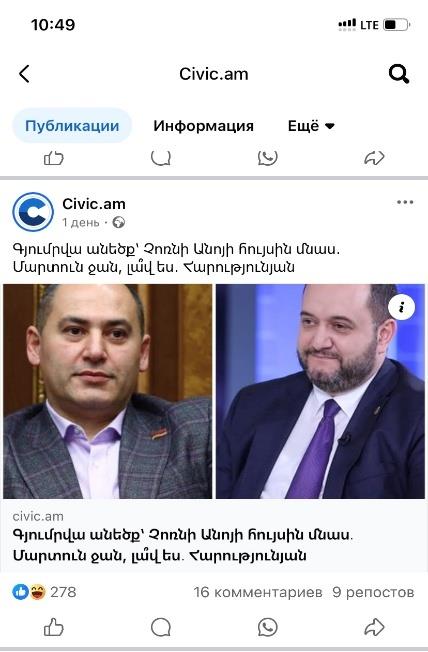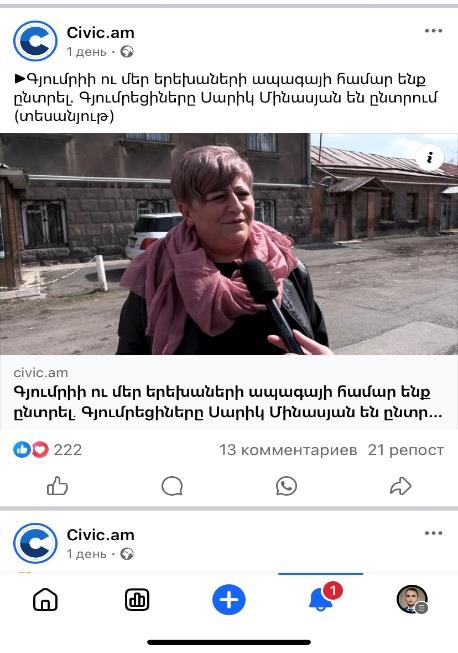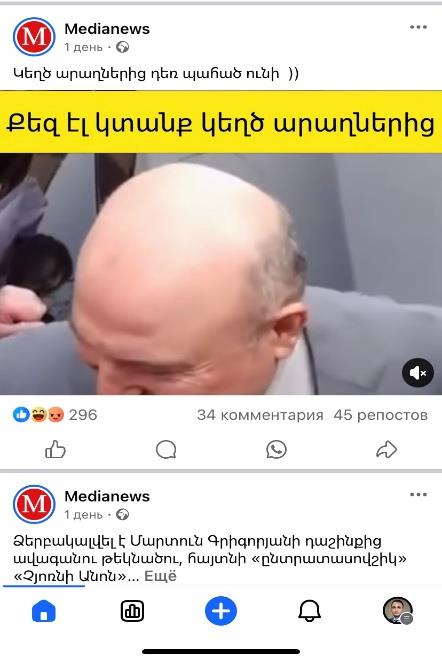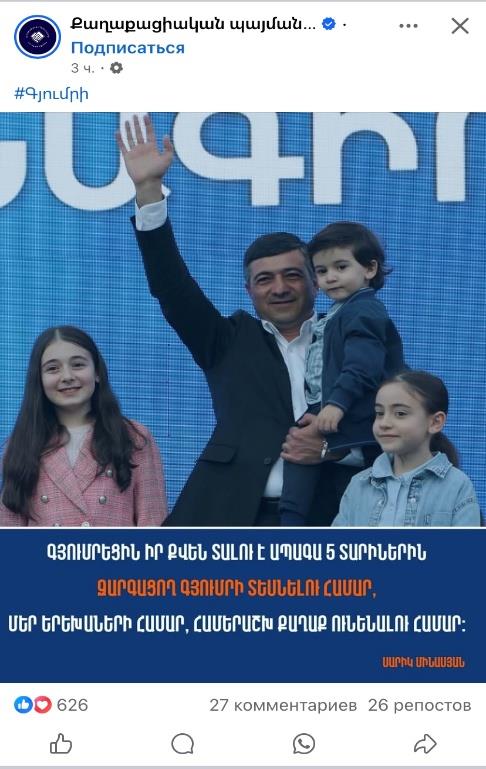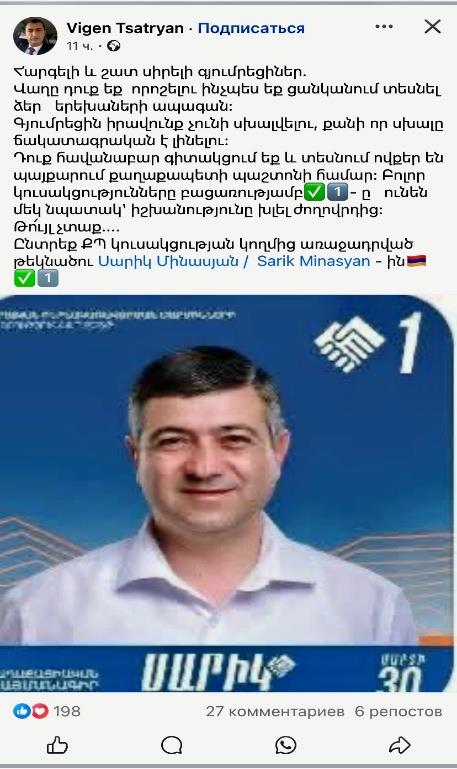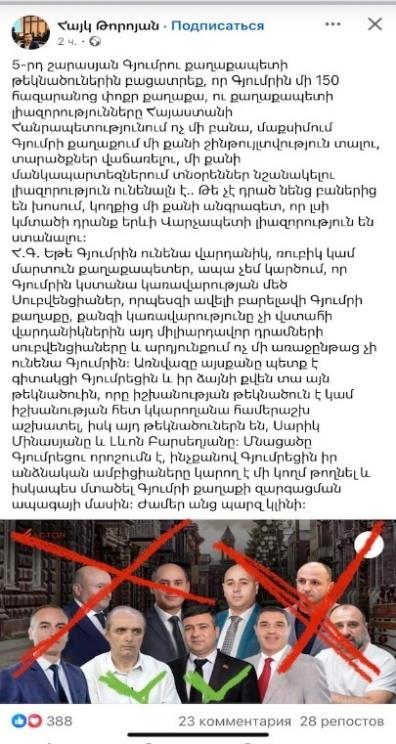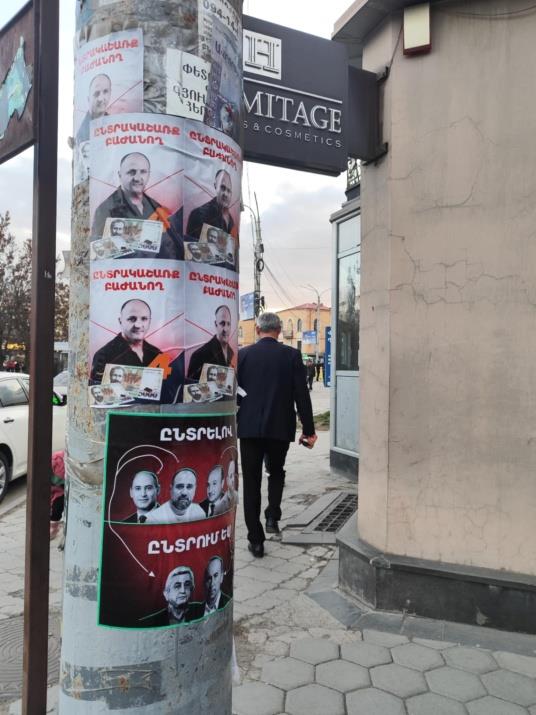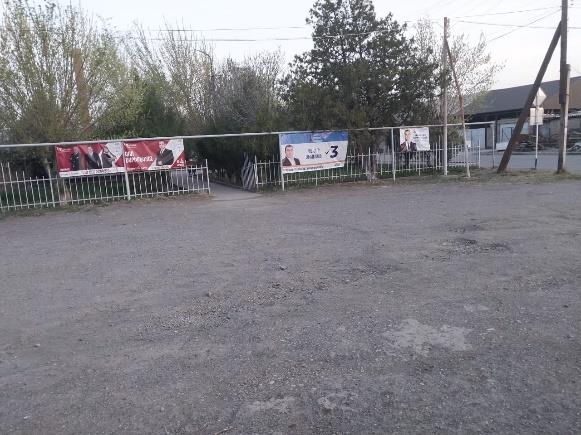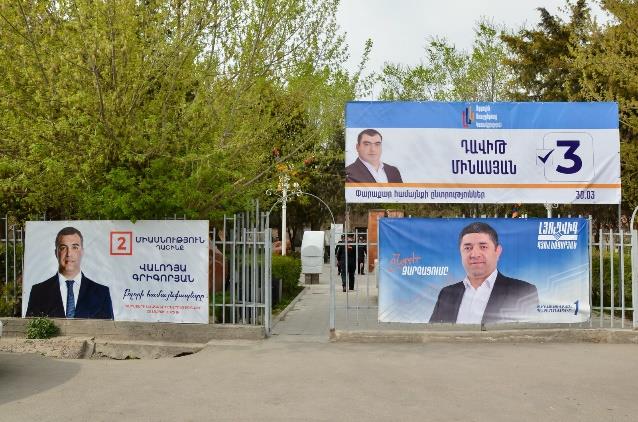On Election Violations Observed by the "HayaQve" Observation Mission During the March
30, 2025 Local Elections in the Communities of Gyumri and Parakar
The "HayaQve" National Civic Alliance (www.hayaqve.am), in cooperation with the “International Center for Parliamentary Development” and the “Federation of Youth Clubs” NGOs, participated as an independent observervation mission in the local self-government elections held in the Gyumri and Parakar communities of the Republic of Armenia from March 16 to April 7, 2025. The organization carried out continuous monitoring of the electoral process, including the observation of voting procedures in 98 polling stations within electoral districts 14 and 31.
As a result of this work, observers engaged by the "HayaQve" Alliance recorded the following
major election violations.
Campaign Phase
On March 18, the website civic.am, which is affiliated with the current authorities, published the “results of a reputable sociological survey,” according to which the prominent frontrunner in the Gyumri elections is the Civil Contract party candidate Sarik Minasyan.
Article 22, Part 2 of the Electoral Code of the Republic of Armenia stipulates that: “When publishing the results of a sociological survey regarding the ratings of candidates or political parties participating in the elections, the organization conducting the survey is obliged to indicate the dates of the survey, the number of respondents and the sampling method, the method and location of data collection, the exact wording of the question, the statistical margin of error, and the commissioning party.”
In this case, not only was this information not published, but even the name of the organization was
missing, which constitutes a gross violation of the law.
Furthermore, during the campaign period, a campaign poster of the Civil Contract party candidate was posted approximately 30 meters from the 31st Territorial Electoral Commission, which is a violation of Article 21 of the RA Electoral Code. Observers reported this violation to the head of the Territorial Electoral Commission, who responded by stating that a notice had been sent to the acting head of the community. However, the violation was not addressed or resolved.
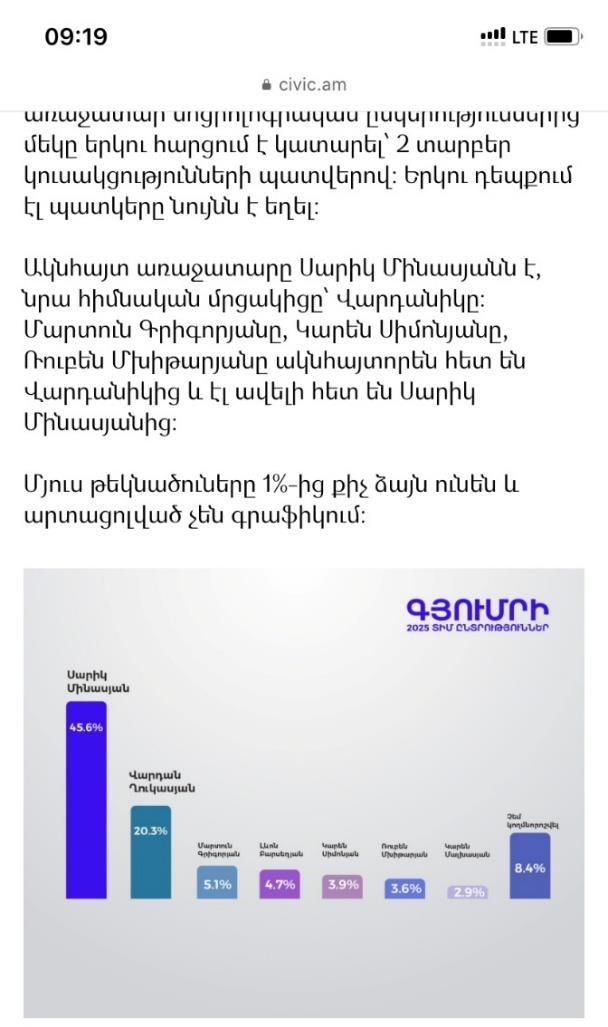
On March 27, during a briefing at the National Assembly, the head of the Civil Contract faction, Hayk Konjoryan, stated that “vote buying is genetically linked to the opposition.” Such a statement is, in fact, defamatory and threatening toward all opposition candidates participating in the local elections, especially since Konjoryan did not specify whom he was referring to. He was echoed by the faction's secretary, Artur Hovhannisyan, who declared that those engaging
in vote buying would be “smashed against the walls.”
As far as we know, issues related to vote buying and other violations of the Electoral Code fall under the jurisdiction of law enforcement bodies. Statements of this nature by the mentioned Members of Parliament may be viewed as interference in the responsibilities of those bodies.
Therefore, both of these statements should be regarded as abuse of administrative resources, which is prohibited by Article 23, Part 1 of the RA Electoral Code. This article states that “the use of administrative resources during the organization and conduct of pre-election campaigning is prohibited, including the use of financial and informational resources, premises, means of transportation and communication, material and human resources provided for the fulfillment of official duties, for the purpose of gaining an advantage in elections.”
On March 28, the Civil Contract party held its final rally in Gyumri in support of its candidate, Sarik Minasyan. A large number of citizens attended the rally, many of whom had been brought collectively from various state institutions, as well as from other settlements in the Shirak region, despite not having a direct connection to the elections.
Although we do not have direct evidence of coercion, the fact that many of these individuals avoided identifying themselves, were unwilling to speak on camera, and quickly left the rally area suggests a reasonable assumption that there may have been undue influence exerted on citizens’ free will. This is prohibited under Article 23, Part 1 of the RA Electoral Code and may also entail criminal liability under Article 236 of the RA Criminal Code.
On the day before the election and on election day itself, the official Facebook page of the Civil Contract party continued campaigning in Gyumri in favor of its candidate. This activity was supported by several Civil Contract party-affiliated campaigners, including Vigen Tsatryan and Hayk Toroyan, as well as the websites medianews.am and civic.am, which were running virtually identical negative campaigns targeting the main opposition candidates.
On the day of electoral silence, illegal posters targeting opposition candidates appeared in various unauthorized locations across Gyumri. This constitutes a violation of Article 21, Part 10 of the Electoral Code of the Republic of Armenia.
On the day of electoral silence and on election day itself, campaign posters were displayed near several polling stations in Parakar, within 50 meters of the entrances. Despite the warnings and requests made by observers and electoral commission members, these posters were not removed.
This violation was particularly evident at polling stations 14/8, 14/12, and 14/15.
Voting Phase
During the voting held on March 30 in the communities of Gyumri and Parakar, our observers recorded numerous electoral violations. These violations can be categorized into several main types:
-
There were frequent unauthorized gatherings of citizens near several polling stations. These gatherings were observed in front of polling stations in Gyumri (31/01, 31/05, 31/14, 31/18, 31/20, 31/39, 31/69, 31/70) and Parakar (14/1, 14/8, 14/15, 14/16). Despite warnings from observers and electoral commissions, the police often ignored them, and after our requests to
disperse the crowds, they reappeared quickly. In fact, we observed that although the Electoral Code, Article 22, Part 3 prohibits the gathering of citizens and vehicles near polling stations, there is no tangible legal responsibility for violating this provision, and such gatherings continue to occur, often with the intent to influence voters' will.
-
Crowding inside the polling stations was more frequent, especially in small and poorly equipped voting areas. Specifically, this occurred in Gyumri (31/01, 31/04, 31/14, 31/29, 31/30, 31/69) and Parakar (14/3, 14/6, 14/8, 14/15). In some cases, moving around within the stations was difficult. This violated Article 57, Part 2 of the Electoral Code, which states that “The voting room must be as spacious as possible and must meet the following requirements:
1) It must allow regular work for the members of the precinct electoral commission, specialists, and other authorized persons present in the voting room (including those with disabilities or mobility difficulties);
2) It must allow members of the precinct electoral commission and authorized persons to keep the technical equipment, the ballot box, and the voting booths in view without violating the secrecy of the vote.”
-
հնարավորություն ընձեռի քվեարկության ողջ ընթացքում ապահովելու տեղամասային ընտրական հանձնաժողովի անդամների, մասնագետի և քվեարկության սենյակում ներկա գտնվելու իրավունք ունեցող անձանց (այդ թվում՝ հաշմանդամություն ունեցող, ինչպես նաև տեղաշարժման (հենաշարժական) դժվարություններ ունեցող տեղամասային ընտրական հանձնաժողովի անդամների, մասնագետների, քվեարկության սենյակում ներկա գտնվելու իրավունք ունեցող անձանց) կանոնավոր աշխատանքը.
-
հնարավորություն ընձեռի տեղամասային ընտրական հանձնաժողովի անդամներին, ինչպես նաև քվեարկության սենյակում ներկա գտնվելու իրավունք ունեցող անձանց իրենց տեսադաշտում պահելու տեխնիկական սարքավորումը, քվեատուփը, քվեարկության խցիկները (պայմանով, որ չխախտվի քվեարկության գաղտնիությունը), քվեարկության խցիկներից մինչև քվեատուփն ընկած հատվածը»:
-
We frequently observed incidents of open voting, where citizens were effectively voting outside the voting booths, or the head of the electoral commission was interfering with the voting process. Such cases were observed in Gyumri (31/02, 31/17, 31/69, 31/70) and Parakar (14/3, 14/14). In some cases, voters even photographed their ballots with smartphones, violating the secrecy of the vote. Specifically, this was observed in Gyumri (31/50) and Parakar (14/5).
-
In some polling stations, incomplete sets of ballots were provided. For example, in Gyumri (31/01), the second ballot was missing twice from the ballot set. In Parakar (14/8), voters were given duplicate ballots for 1 and 4, while the 2 and 3 ballots were missing. This issue was recorded in the register at 6:00 PM.
-
Campaign posters were displayed within the prohibited distance of several polling stations, primarily supporting the ruling party’s representative. This occurred near polling stations in Parakar (14/8, 14/12, 14/15) and Gyumri (31/07, 31/20, 31/27, 31/39).
-
In many polling stations, representatives of the ruling party were openly tracking the votes of voters, marking those who supposedly voted for their party in the available voter lists. Such incidents were observed in Gyumri (31/04, 31/45, 31/57, 31/65, 31/15, 31/29, 31/50, 31/62, 31/27, 31/71) and Parakar (14/3, 14/4, 14/11, 14/12, 14/14).
-
In several polling stations, the same vehicles were repeatedly transporting groups of voters to vote. This was observed near polling stations in Gyumri (31/05, 31/29, 31/47, 31/48, 31/59, 31/62) and Parakar (14/4, 14/9, 14/12).
-
In several polling stations, the booths did not ensure complete secrecy of the vote, as they were visible through nearby windows, doors, or even cameras. This was observed in Gyumri (31/17, 31/27, 31/65) and Parakar (14/13).
-
In several polling stations, the heads and secretaries of electoral commissions consistently resisted the recording of violations reported by the observers, despite it being their direct responsibility. Such violations were recorded in Gyumri (31/01, 31/57).
-
In the immediate vicinity of certain polling stations, representatives of law enforcement agencies in civilian clothes were observed, which is not provided for by the law. This occurred near polling stations in Gyumri (31/05) and Parakar (14/8, 14/12).
These violations have been recorded in the corresponding precinct commission registers, photographed, and videotaped. If necessary, we are ready to provide additional materials to substantiate our observations.
After reviewing the various violations we recorded, we conclude that although the local elections held on March 30, 2025, appeared to be free on the surface, they occurred under conditions of mass interference with citizens' free will. The continuous gathering of politically biased individuals in front of polling stations, the transportation of voters in groups, the open recording of voters supporting the ruling party, and multiple violations of the secrecy of the vote suggest that these actions were organized and deliberate. The intent was to influence citizens’ expression of their free will, which negatively impacted both the final election results and their public perception.

